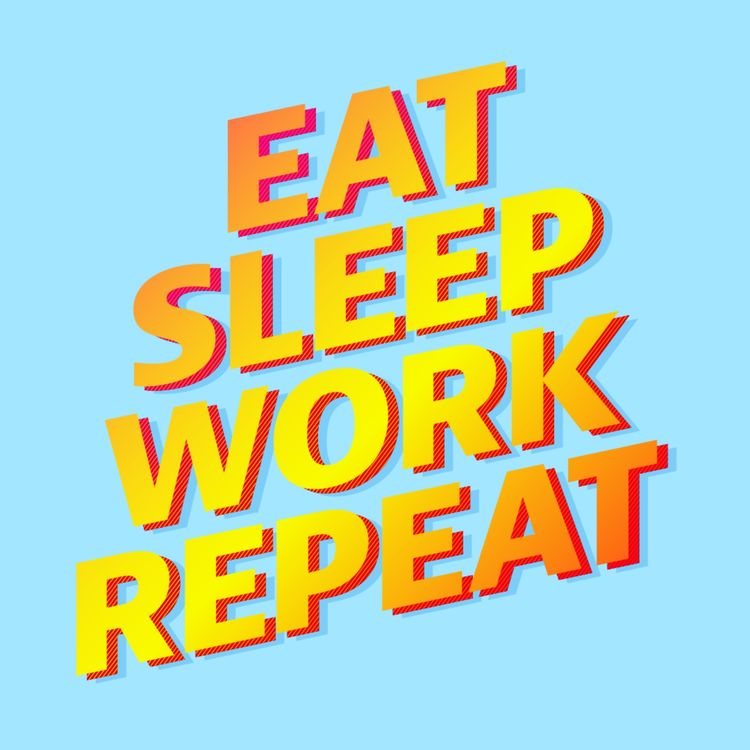Share

Eat Sleep Work Repeat - better workplace culture
The UK's top careers coaches want to solve your job worries
As we start a new year considerations about the jobs we do have never been more prominent. One headline this year has already suggested that up to three-quarters of us might be considering changing jobs. Intriguingly money doesn't appear to be in the top five reasons to make a change.
I wanted to understand what was going on here, and what any of should be doing about it. Helen Tupper and Sarah Ellis are the UK's most respected careers coaches. Their first book The Squiggly Career is a perennial bestseller, and has become adopted into the lexicon of how we talk about a renegotiated relationship with our careers. Their TED Talk has received millions of views. They have a new book out, You Coach You, which offers practical coaching for anyone curious about changing their career. Some of their suggestions - like job scanning - will help you reorientate what you want from your job - and how you can achieve it.
Whether you're thinking about changing work - or just have friends who are considering it - this is a great episode to help us reflect on what we want from our jobs.
Buy You Coach You now
Sign up to the Make Work Better newsletter or check out the best ever episodes at the website.
Eat Sleep Work Repeat is made and hosted by Bruce Daisley.
More episodes
View all episodes

225. The more you talk about culture, the less people believe you
47:03||Season 12, Ep. 225Today's conversation is with Professor Benjamin Laker, someone I've long admired for his cutting edge work on the evolution of culture. His article on Meeting Free Days is probably the piece of research I've shared the most in the last 5 years.Laker is Professor of Leadership at Henley Business School, which is part of the University of Reading. As well as writing multiple bestselling books on work like Too Proud to Lead and Job Crafting, he's also published dozens of articles in HBR and MIT Sloan Management Review. He's worked with government helping to develop policy on work and it's evolution.I could have chatted to Benjamin about dozens of things but I specifically wanted to dive into a sensational piece he wrote in Harvard Business Review at the end of last year about changing culture inside of organisations.Full transcript on the website
224. Flourishing at Work
39:11||Season 12, Ep. 224Daniel Coyle returns to reflect on what has changed since we last spoke. He's moved attention to an examination of what contributes to us getting a fulfilling experience from work - and life.We talk attention, community and the way that great teams demonstrate 'group flow'. We also delve into some research by Nick Epley that I've covered on the newsletter, that suggests we're terrible at predicting what will make us happy.If you like this check out the previous episodes with Daniel:Dan Coyle can fix your broken cultureThe Culture Code
223. What makes for the Best Place to Work
22:18||Season 12, Ep. 223I'm joined by Daniel Zhao, chief economist of Glassdoor, who talks me through their new rankings of the best places to work in 2026.It's an intriguing list, is a car wash really better than some of the most famous tech brands in the world?The ranking allows us to explore what we want in a job: culture, connection, progression and autonomy.Bad culture is 7 times more powerful driving quitting than salary: hear Charlie and Donald Sull talk about Glassdoor dataGlassdoor: Top US places to workGlassdoor: Top UK places to workFull transcript on the website
222. Culture is built on 'moments of truth'
31:46||Season 12, Ep. 222Kevin Green is the Chief People Officer for First Group.He's set about reinventing the culture of the organisation from the ground up.I heard Kevin speak at an event last year was completely bowled over by the way he talked about culture and the way he was trying to build it. I think you'll love this discussion. There's a full transcript on the website.Also mentioned: Waitrose culture episode with Lord Mark Price
221. People-watching in the workplace
42:32||Season 12, Ep. 221Dr Karen Bridbord is the author of a new book, The Relationship-Driven Leader that invites us to bring a psychologist's lens to our job and the relationships with those around us.Her perspective is to use psychology to understand the person in front of you to interpret the world through their eyes. If you’ve got a controlling boss or someone who behaves in a way that impacts your life she helps you unpick what’s going in their head. The Relationship-Driven Leader: Strengthening Connections to Enhance Productivity and Wellness at Work
220. What Gen Z need from work
38:38||Season 12, Ep. 220Gen Z have been shaped by recessions, the pandemic, geopolitical instability, not to mention financial insecurity and world changing technology.That's the finding of the Edelman Gen Z Lab as told to me by the leader of the project Jackie Cooper. Most powerfully she explains that Gen Z's have a 'visceral need for safety' - that's financial, social, cultural and even physical.They respond to fear by asking questions and wanting to be heard, which older generations often misread as entitlement or disrespect for hierarchy.Politically, Gen Z is fragmented. Younger Gen Zs, especially boys/young men, are leaning more conservative and drawn to strong-man archetypes; older Gen Zs, shaped by Obama / BLM, are more idealistic about progressive politics. Algorithms and “TikTok-isation” amplify those splits.I was blown away to see Jackie Cooper from Edelman talk about the research that the company has done to understand the new generation of workers entering the workplace - I think you'll love this discussion. You can read the report hereFull transcript on the website.
219. Is training really corporate sludge?
42:21||Season 12, Ep. 219Most company training is a waste of time that turns firms into bureaucratic sludge holes. That’s roughly the conclusion of today’s episode which is a conversation with Andre Spicer and Mats AlvessonThey have a new book out The Art of Less. Andre has been a guest a few times before - way back in 2018. This podcast is old. In 2018 this podcast was ahead of Steven Bartlett’s Diary of a CEO at the top of the podcast charts. (Andre talking about open plan offices)The idea that much of what companies do is related to their self identity, what the company aspires to be in the world - with the end result that it doesn’t achieve these things.Things we discuss:'The Death of the Corporate Job'how 'initiative-itis' is dragging down organisationshow training is corporate sludge that doesn't achieve its goalscorporate culture as an act of 'grandiosity'
218. Strong team identity delivers success
45:24||Season 12, Ep. 218Jeremy Holt is a psychologist and leadership coach who has spent more than 20 years helping teams get better. Read his research about better team results.This episode is the third part of a series about the power of identity in teams. Listen to the other Eat Sleep Work Repeat episodes about identity.Jeremy posting about identityWatch the Lebron documentary More Than a GameJeremy's book For the Love of the Game
217. To understand leadership, you need to understand identity
51:51||Season 12, Ep. 217This is the second part of an interview with Professor Alex Haslam, the world's leading voice on the study of social identity.You can hear the first part of this interview on the website.In this discussion we talk how social identity can help us understand leadership.Alex talks about the CARE model of leadership.C - Create the groupA - Advance the group (sometimes over themselves)R - Represent the groupE - Embed the group identity in everyday life for the groupIf you're interested in exploring Alex's recent contributions to discussions on leadership and culture these papers are a great place to start:Zombie LeadershipHuman Me-sources or Human We-sources - exploring leader narcissismAlex Haslam is Professor of Social and Organisational Psychology at the University of Queensland. He is one of the world’s leading researchers on group dynamics, leadership, and identity. Over the past three decades, Alex has helped reshape our understanding of how people think, feel, and behave as members of groups, and why social identity is central to motivation, resilience, and effective teamwork.